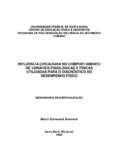| dc.contributor.advisor | Portela, Luiz Osório Cruz | |
| dc.creator | Behenck, Mauri Schwanck | |
| dc.date.accessioned | 2015-11-13T12:04:52Z | |
| dc.date.available | 2015-11-13T12:04:52Z | |
| dc.date.issued | 2006-06-24 | |
| dc.date.submitted | 2006 | |
| dc.identifier.uri | http://repositorio.ufsm.br/handle/1/1123 | |
| dc.description | Monografia (especialização) - Universidade Federal de Santa Maria, Centro de Educação Física e Desporto, Curso de Especialização em Pesquisa e Ensino em Ciência do Movimento Humano, RS, 2006. | por |
| dc.description.abstract | In the context of the evaluation and diagnosis of the physical performance, the
knowledge deriving from the Cronobiologia, becomes important, because these
knowledge allow to understand each other and to consider the variations that are
happening to all the moment in our organism. Considering that the physical
evaluation in Laboratories of Physiology of the Exercise, today, is a reality in several
areas of the Country and it bases on the answer certain variables to the physical
stress caused by the exercise, it is ignored to what extent the non observance of the
shift of the evaluation, it can have effect on the diagnosis of the physical performance
accomplished in these laboratories. Thus, it was looked for to investigate the
circadian influence on the behavior of specifics physiologic and physics variables in
progressive test of maximum effort used for the diagnosis of the physical
performance in young adults. Six individuals were investigated (03 men and 03
women), volunteers, physically actives, healthy with the following characteristics:
percentile of fat of 16,61±7,70%, stature of 169,85±10,45 cm, corporal mass of
60,29±11,30 kg and 22,50±2,65 year-old age. The individuals attended in two
different days (with interval of seven days) in the Laboratory, and in one of the days
the variables was accomplished the 9:00 and in the another it was accomplished the
16:00. The analyses were accomplished in rest and during the exhaustive
progressive test with the following variables: consumption of oxygen, production of
CO2, ventilation, respiratory quotient, heart frequency, seric lactato, maximum speed
of race and total time of test. The obtained results, they didn't present difference
among the different periods of the day (9:00 and 16:00), when using the test of
Wilcoxon, considering as significant a p < 0,005. Thus, considering the used protocol
and the assessed group, the diagnosis of the physical performance, tends as base
the behavior of specifics physiologic and physics variables in progressive test of
maximum effort, it doesn't suffer influence circadiana, suggesting that there is not
obligatory to realize the second assessment of the physical performance in the same
shift of the day of that accomplished previously. | eng |
| dc.language | por | por |
| dc.publisher | Universidade Federal de Santa Maria | por |
| dc.rights | Acesso Aberto | por |
| dc.subject | Diagnóstico do desempenho físico | por |
| dc.subject | Ritmo circadiano | por |
| dc.subject | Avaliação ergoespirométrica | por |
| dc.title | Influência circadiana no comportamento de variáveis fisiológicas e físicas utilizadas para o diagnóstico do desempenho físico | por |
| dc.title.alternative | Circadian influence on the behavior of specifics physiologic and physics used for the diagnosis of the physical performance | eng |
| dc.type | Trabalho de Conclusão de Curso de Especialização | por |
| dc.degree.local | Santa Maria, RS, Brasil. | por |
| dc.degree.specialization | Pesquisa e Ensino em Ciência do Movimento Humano | por |
| dc.description.resumo | No contexto da avaliação e diagnóstico do desempenho físico os conhecimentos
advindos da Cronobiologia, tornam-se relevantes, pois, estes nos permitem entender
e considerar as variações que estão ocorrendo a todo o momento em nosso
organismo. Considerando que a avaliação física em Laboratórios de Fisiologia do
Exercício, hoje, é uma realidade em diversas regiões do país e baseia-se na
resposta de determinadas variáveis ao estresse físico causado pelo exercício,
desconhece-se até que ponto a não observância do turno da avaliação, pode ter
efeito sobre o diagnóstico do desempenho físico realizado nestes laboratórios.
Assim, buscou-se investigar a influência circadiana sobre o comportamento de
variáveis fisiológicas e físicas específicas em teste progressivo de esforço máximo
utilizadas para o diagnóstico do desempenho físico em adultos jovens. Foram
investigados 06 indivíduos (03 homens e 03 mulheres), voluntários, fisicamente
ativos, comprovadamente aptos para realizarem esforço físico exaustivo idade de
22,50±2,65 anos. Os indivíduos compareceram em dois dias distintos (com intervalo
de sete dias) no Laboratório, sendo que em um dos dias a coleta de dados foi
realizada as 9h e no outro foi realizada as 16h. As análises foram realizadas em
repouso e durante o teste progressivo exaustivo tendo em vista as seguintes
variáveis: consumo de oxigênio, produção de dióxido de carbono, ventilação, taxa de
troca respiratória, freqüência cardíaca, lactato sanguíneo, velocidade máxima de
corrida e tempo total de teste. Os resultados obtidos, não apresentaram diferença
estatisticamente significativa entre os diferentes períodos do dia (9h e 16h), ao
utilizar o teste de Wilcoxon, considerando como significativo um p<0,05. Assim,
considerando o protocolo utilizado e o grupo avaliado conclui-se que o diagnóstico
do desempenho físico, tendo como base o comportamento de variáveis fisiológicas e
físicas específicas em teste progressivo de esforço máximo, não sofre influência
circadiana, sugerindo que não há obrigatoriedade de realização da reavaliação do
desempenho físico em laboratório no mesmo turno do dia daquele realizado
anteriormente. | por |
| dc.publisher.unidade | Centro de Educação Física e Desportos | por |


